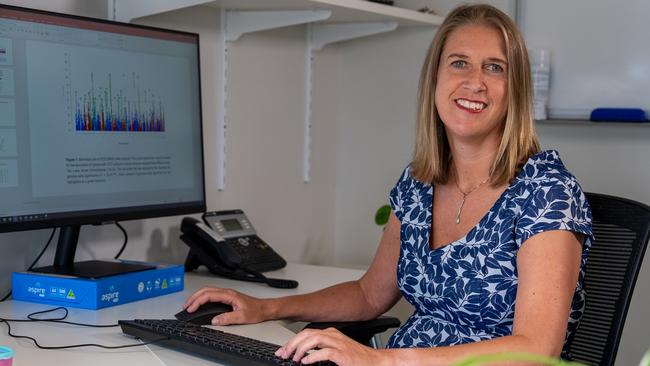‘Trapped in their own worst nightmare’: OCD under the microscope
Scientists understand for the first time which genes and brain regions are linked to OCD, after a watershed study put millions of brains under the microscope.

A global study of obsessive compulsive disorder unmatched in scale and led by Australian researchers has found the condition’s genetic cause, carving a path for shorter diagnoses and personalised treatments.
QIMR Berghofer released the findings from a new study on Tuesday in which it identified 30 sections of the genome and 250 genes linked to OCD.
Its results were published in Nature Genetics.
Using this knowledge, researchers will try to match existing drugs to the relevant genes identified and determine whether new treatments can be matched and personalised to patients. With further research, it hoped the results could improve diagnosis as OCD becomes easier for clinicians to isolate.
QIMR Berghofer neurogenomics researcher Eske Derks said finding biological groundings for a disorder help destigmatise it. “We’ve been working on this for many years, but these findings have dramatically increased our knowledge of the genetic basis of OCD,” Professor Derks said.
“We found a really large number of genes which are shared with anxiety disorders, depression and with anorexia nervosa. There’s a lot of overlap in the genes that cause these different mental health conditions.

“The next steps for our research team are to use these genetic discoveries to identify existing drugs being used to treat other conditions that may be effective for OCD patients, paving the way for more innovative treatment options.”
Most affected genes were concentrated in the hippocampus, cerebral cortex and striatum, neural regions found along the front and centre of the brain. The three are responsible for memory, thought processes and reward processing, all of which are cognitive functions impaired by OCD.
“The hope is that these results can be used to identify drugs that will be more effective for treating OCD,” Professor Derks said.
“We found the strongest genetic overlap with anxiety disorders … but also with anorexia nervosa. Both disorders have this control mechanism where people try to have control over their environment or over their diet and find it difficult to change.
“It’s definitely telling us a story about how mental health conditions are related. We know there’s a large comorbidity; if someone has OCD, they’re also more likely to be diagnosed with anxiety disorders or with Tourette’s syndrome, for example.
“So the genetic data help us to explain why that is, and also how you can treat it in the future when people have more than one condition.”
The Nature study was the largest of its kind and involved a broad consortium of international partners who pulled together a study group of 50,000 OCD patients and a control group of two million people without the condition.
OCD specialist Emily O’Leary said the bulk of patients delayed treatment for OCD, allowing it to worsen and metastasise. “Clients will come to us typically 10 to 14 years after diagnosis and by this time they are really unwell,” Dr O’Leary said.
“ What this research shows us is that we can be more proactive and actually start looking at who is more likely to develop the disorder.
“People who suffer from OCD are driven by a fear they’ve done something wrong, or that they’re going to do something wrong. They worry they could hurt their loved ones or themselves. For people with OCD, it’s like being trapped in their own worst nightmare.”
OCD is typically treated with a combination of talk therapy, medication and specialised treatments tailored to its varieties. Manifesting from adolescence or earlier, it affects 500,000 Australians.
Common preoccupations for those affected include cleanliness, symmetry, contamination, checking, hoarding, harming, arranging or counting.
The results expand upon another Nature brain mapping study from August 2023 that isolated deviations in the brain for those affected by a range of conditions – analysing schizophrenia, depression, autism and others in addition to OCD.






To join the conversation, please log in. Don't have an account? Register
Join the conversation, you are commenting as Logout